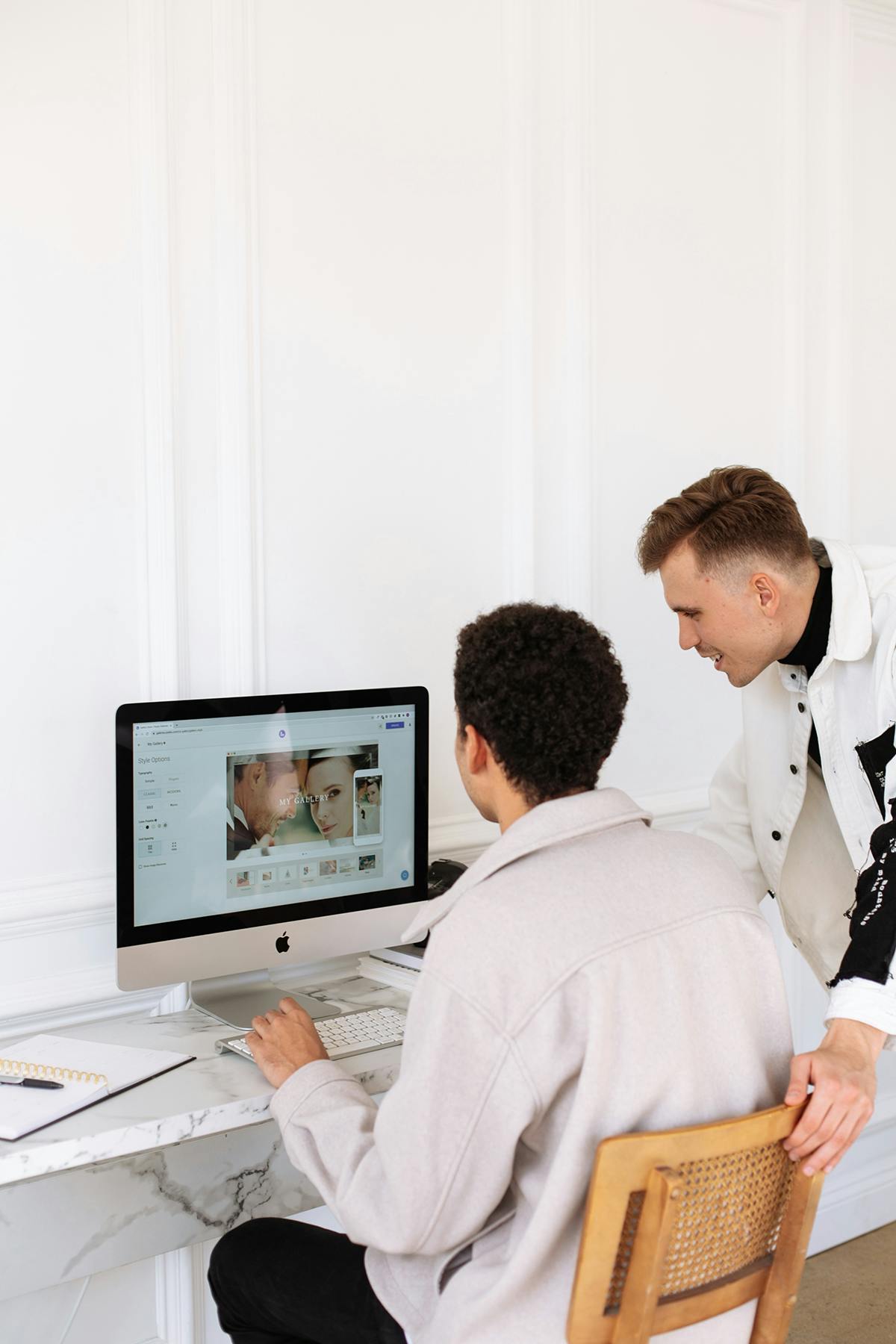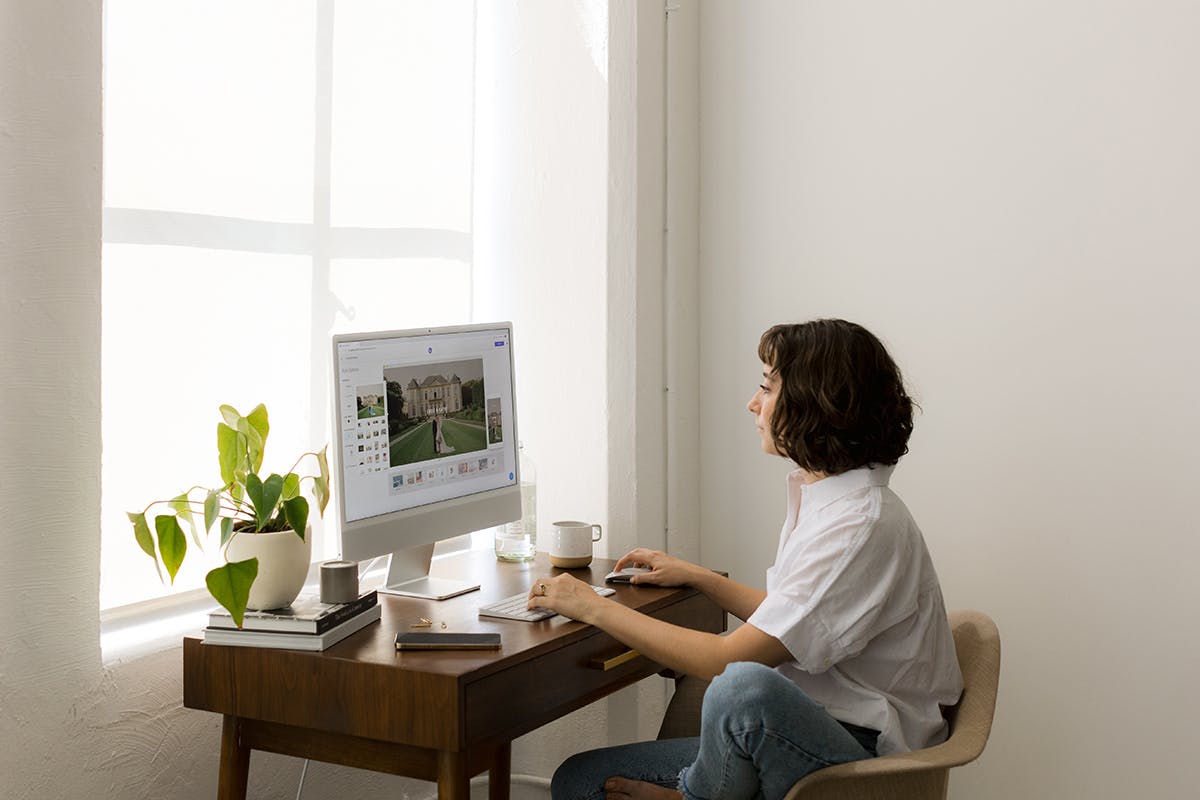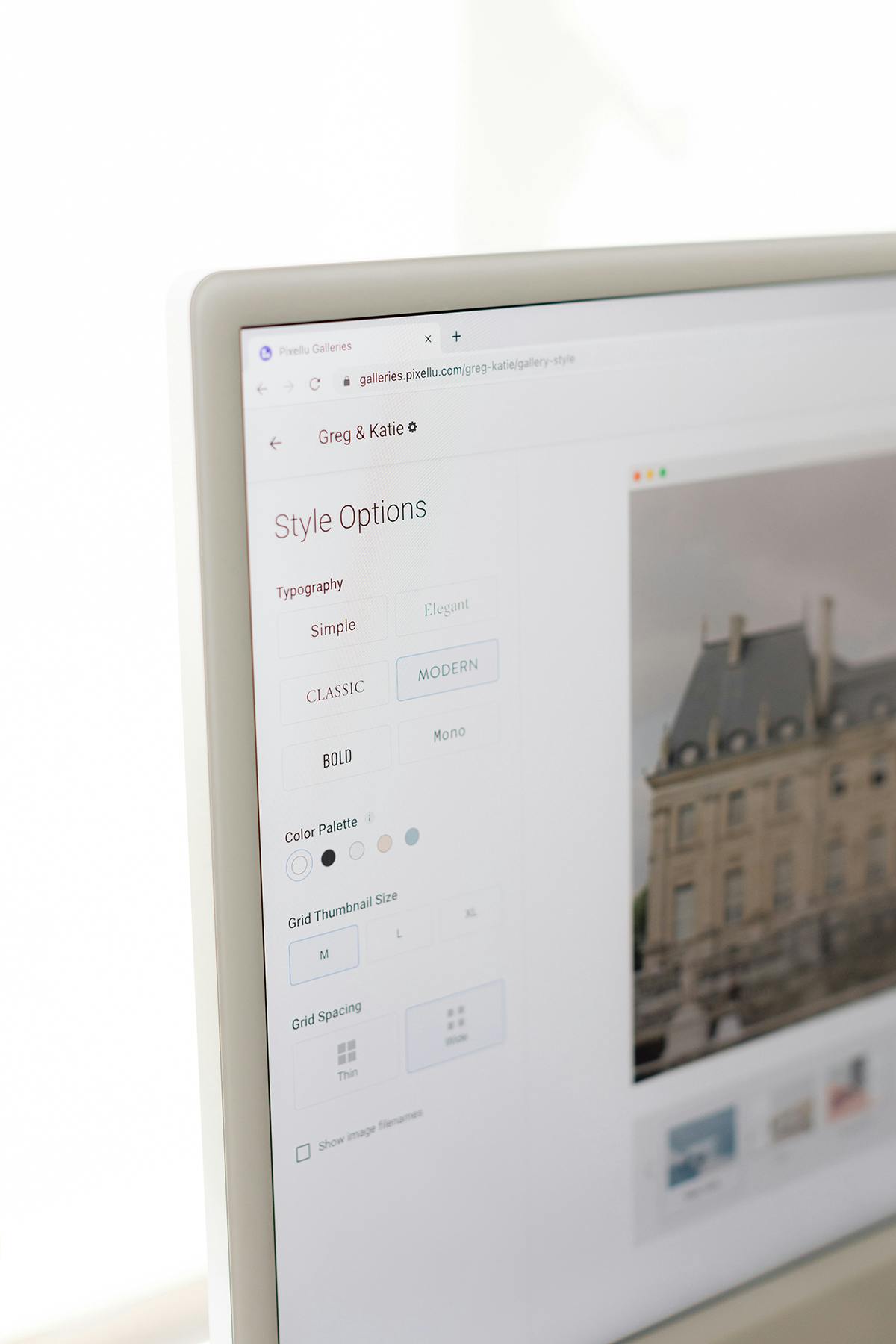How to Start a Photography Business with no Experience
It's a question that professional photographers get asked repeatedly — how to start a photography business?
Perhaps you're the first to pick up a camera at a family gathering. Maybe you're drawn to moments full of emotion and wish to freeze them in time. Or perhaps you're forever composing the perfect frame in your head and get a real kick when your photo turns out how you envisioned it? There are a million reasons to be drawn to photography — we get it! There's something magical about capturing a moment that will be treasured for generations.

How to start a photography business with no experience.
There's a vast difference between capturing the perfect selfie and consistently catching the right moment on a wedding day or during a family shoot when the kids are zooming in all directions. But if you've come as far as Googling "how to start a photography business," then you probably already know there's much more to photography than pointing your phone and spamming the "capture" button.
Starting a photography business is a great way to generate either some side-hustle cash or a full income — it is possible to make good money as a photographer with a bit of business-know-how. Turning our passion into a career is how most of us became photographers in the first place, and we all had to start from somewhere. Many of us even had to learn how to start a photography business with no experience at all.

Any business endeavor is a massive undertaking. You may not have much experience or training in professional photography, much less a portfolio, but if you're drawn to the profession, now is the time to explore your next steps.
With a bit of guidance, research, and help, learning how to start a photography business with no experience isn't unachievable. In fact, many of the thousands in our Pixellu community have done exactly that, turning their passion into a lasting, sustainable career.
Let's start with the basics.
Step 1: Start a photography business by putting your vision on paper.
You've probably heard a thousand times: "Failing to plan is planning to fail." And although it may be a bit cliché, there's truth to the saying — planning (or dreaming if you want to use a less rigid term) is vital to starting any new venture. And getting your ideas down on paper is the best way to launch into action and start a photography business.
Make a day of it! Go to your favorite cafe, get a piping coffee, and start dreaming about what you want your photography business to look like.

Begin by asking yourself a few questions to envision your business. The answers don't need to be "right" — there may not be a "right" answer. You probably have a million plans running around in your head, and this exercise will help organize your thoughts and give your ideas some structure.
- What sort of photography do you want to focus on? Do you want start a wedding photography business? Or perhaps you'd prefer to focus on families, portraits, or boudoir?
- Where do you want to be six months from now? One year from now? What about five or ten years from now?
- Is this business a side gig or a full-time career?
- How will you successfully transition from your day job to becoming a full-time photographer? Or do you intend to keep working full-time and start a photography business on the side?
- Is there a successful photographer you admire? What do you admire about their life and business? How does their life compare to yours — what do you like and dislike?
- What services will you offer? How many hours will you commit to your business each week, and how does this fit with the rest of your life? How many clients do you think you can shoot with your available time? And how much do you need to charge for this to be financially viable?
These can be estimates for now — the important thing is to set a starting point on paper. Your numbers will likely change as you learn more about starting a photography business.
Give yourself time and space to think about each of these questions, then write down what feels right in the moment. This process is about dreaming big, inspiring yourself to carry on with the process, and getting your photography business off to a positive start.
Step 2: Before you start your photography business, get your legal ducks in a row.
Dreaming is important from a mental standpoint to help you start a photography business. But ensuring your photography business is legally legit from the get-go is vital — even if this is only a side hustle for now.
You may want to consult an attorney for guidance on this step, and the advice you need to follow will vary from country to country.
Establishing a business entity also allows you to create some separation between personal and business liability should a problem arise. Having your legal ducks in a row is important, not just as a layer of protection, but to ensure your clients see you as a professional. A legal business creates some clout you’d otherwise miss if you sent a payment request from your Venmo account.

Different business entities may have various tax ramifications or benefits. Whether you decide to set up your business as a Sole Proprietorship, LLC, or S Corp is up to you, but the most important thing is that you do what’s best for you and your business goals.
Another important detail while starting a photography business is to get any required business licenses and insurance. This process will vary from country to country, so you’ll need to look up your local requirements.
If you’re in the U.S.A, these requirements will also vary from state to state — you can check this information online with the Secretary of State. Your county clerk’s office will also likely be a helpful resource, especially with any local legislation or ordinances you must be aware of. You’ll also want to get an EIN (Hint: An EIN is to your business what a Social Security Number is to you).
After filing the necessary paperwork, you can set up a business bank account. Some banks are online only, which may be preferable if you plan to start a wedding photography business or become a destination or elopement photographer.
Other business owners prefer to set up an appointment at a local bank or credit union to get their business banking started and experience more of a hometown feel. You’ll also want to decide whether you want a business credit card for some of the major purchases you’ll likely need to make as you start a photography business.

Step 3: Don’t fall into the trap of “all the gear and no idea.”
New gear is exciting. Camera companies make big money from generating hype around their latest releases. But if you wait until you have all the top-of-the-line equipment, there’s a good chance your plans to start a photography business will never come to fruition.
In reality, it’s not the gear that makes the photographer — and while a great camera can make things a lot easier, buying the latest release body with a million megapixels isn’t going to instantly make you as successful as the photographers that inspire you. Their success and signature style has evolved through practice, perseverance, and hard work. Top-of-the-line gear doesn’t allow you to skip this step.
As you work towards starting your photography business, it’s more important to buy something functional that doesn’t break the bank. By this stage, you’ve probably already decided what genre of photography you want to pursue — what images you’re drawn to capturing. Look at the photographers that inspire you within your niche and see what older gear they’re selling, what equipment they used a few years ago, and which bits and pieces of their (probably extensive) kit they use the most often. This information is a great starting point for your research into what sort of gear to buy.

Research the cost of each piece of equipment you think you’ll need, and be prepared for what sort of investment setting yourself up will be. Know that you don’t need everything all at once. You can buy as you go, especially if you start as a second shooter.
Be sure to budget for any continuing education, subscriptions, and photo editing software. Many people forget to also “budget” their time as they start a photography business. You’ll need to learn how to best utilize your new tools and software, and this won’t happen overnight. Even free applications still require a time investment to master. For example, you might start with a free trial of SmartAlbums to see if you can add to your income from each shoot. The software is incredibly intuitive, but the first album you create will always take more time than the professionals who produce albums for every shoot. This learning curve applies to each piece of software and hardware you purchase, and you need to allow time in your schedule for this growth.
Step 4: Consider getting a mentor who knows how to start a photography business.
Having a mentor in your corner as you start a photography business can be extremely valuable and potentially accelerate your path to achieving your goals with less stress.
If there is a local photographer you admire, reach out to see if they’d be willing to have coffee and discuss a potential mentorship or apprenticeship. If you live near a major university, look into photography internships through the school.

When you meet with a mentor, you could offer to spend some time working as a second shooter (or third) at weddings to learn how they move through the event, capture intimate behind-the-scenes moments of the couple, position group shots, and execute their vision with confidence. Keep an eye on how they behave and manage any problems and how they redirect bossy, pushy, or grumpy family members. There’s nothing like real, on-the-job experience. Plus, you may get permission to add some of this work to your portfolio — keep reading for more on building your portfolio.
Another option to gain experience while starting a photography business is to join an in-person or online workshop, a course, or a group coaching program with a photographer you’d love to learn from.
While getting a mentor is not required, having their encouragement and learning from their professional experiences (and mistakes) around how to start a photography business provides extra support as you get going.
Step 5: Set up a professional portfolio to start a photography business.
Even though you might be just starting a photography business, it doesn’t have to feel like that to your clients.
Never underestimate the power of visual storytelling as you build your professional portfolio. Your portfolio — be it a website, a gallery, or simply your Instagram page — is one of the first impressions you will make with potential clients. It’s essential to fill this with photography representing the work you’d like to continue doing. Many well-known photographers will tell you that it’s important to “show what you sell,” meaning that if you want to focus on newborn photography, you need to show clients that you are capable within that niche.

Before you take on the first paying client, try offering sessions to friends, family, and loved ones — you’ll get some practice to hone your craft while you start your photography business. In exchange for your time and talent, you can build a more comprehensive portfolio and get a glowing testimonial to help increase inquiry from paying clients.
As you build your portfolio, remember it's not all about the imagery — words are often an underestimated portion of your portfolio. It's crucial to include powerful stories from your clients to help connect your work and the sense of joy your clients (or, for now, friends and family) feel when they see the photos of their special moments. Social proof or testimonials that highlight the emotions of your client's experience and journey can help create a sense of excitement and anticipation that will help others feel at ease when it comes to clicking that "Contact" button.

Remember to get the proper releases signed if you intend to use your client's images and words across your website and social media. You can offer to redact (i.e., block out) identities or identifiable information to give your clients some privacy while still using their images and feedback.
When it comes to creating and housing your portfolio, there are many available to you. A lot of photographers will build a templated website on Squarespace or Wix. But while you're starting your photography business, creating a free gallery is an easy way to get your work online in minutes — you can add your branding, create sections for different types of images, and password-protect it if you want to limit access.
{{banner}}
The most important thing to remember is that you don't need to have hundreds of images. Pick only your best shots, ensure they feel cohesive, and only highlight photographs that align with the work you'd like to book. If you want to start a wedding photography business but only share photos of your nieces and nephews, you'll likely book more family shoots than convince a couple to take a chance on you for their big day.
Step 6: Don’t just start a photography business, build a brand.
When you Google “how to start a photography business,” most of the articles will tell you you need some branding — the majority of the time, they’ll suggest you hire a designer on Fiverr or DesignCrowd to create a logo for your business. But there’s much more to branding than a logo.

It can be overwhelming to try to define everything at once — thankfully, you can work through this in stages and parts. As your business begins to grow, you’ll want to create some continuity across everything your clients see — this is how you remain memorable and establish trust with potential clients.
Name:
One of the first things to consider when starting a photography business is your business name. First, determine if you want to associate your own name with your photography business to establish a personal brand or if you’d prefer to develop a separate brand. Both have benefits and drawbacks. For example, a personal brand allows you to be yourself and pivot the business as necessary. In contrast, a less personal brand provides a clear delineation between you and your photography business which may lend itself to more clarity and better boundaries.
Visual identity:
This covers everything from your logo, to the fonts you use across your website, emails, and any documentation. It also includes the look and feel of your website or portfolio and the style and content of the images you post to social media. You don’t need to define these all at once. But, as you start a photography business, you’ll want to be aware that these should feel cohesive. They should also all feel representative of the experience you want your clients to have and the sort of photography you’d like clients to pay for.
Your personal brand:
As you build your photography business, it’s important to remember that you are your own brand — a walking billboard for your services. Being your own brand doesn’t mean you need your logo splashed across your shirt, but the way you act and make people feel will ultimately influence whether or not someone would book or recommend you. Even experienced photographers will tell you that most of their business comes via word-of-mouth, and people are, by nature, judgemental. Everything from the clothes you wear, to the level of organization you display, to the cleanliness of your gear, bags, and car will cause people to form an opinion about you. It’s important to still be yourself — if you wouldn’t normally wear a tie, then don’t wear one. But little things like showing up on time, in clothes that aren’t rumpled, clean shoes, and bringing your own water and snacks will help build trust with your clients that you can be relied upon to a) be there, and b) deliver what you’ve promised.
Step 7: Take care of yourself: Start a photography business, and stay in business.
Photographer burnout is real, especially in the wedding industry.
As you work towards starting a photography business, remember to build your business around your life rather than the other way around. This way, when you see success, it's sustainable.
Capturing someone's special moments can be a lot of fun. But it's also a high-energy job. Many photographers run on adrenaline during a shoot, and you often feel like you need to be "on" the whole time, which can also be exhausting. As you build a career and business around these moments, it's important to remember that you will probably experience days where you don't feel as inspired, creative, or energized — and you'll almost certainly be faced with some situations that are downright stressful.

Remember that your photography career is unique because you get to be with people during some of the best and most memorable moments in their lives and help them capture memories that last a lifetime.
But you're a human being too, not a machine, so as you start a photography business, remember to set aside plenty of time before and after shoots to take care of yourself. Before going into a work weekend, take some time to energize yourself. This process will look different for different personality types. Some photographers find exercising works well, while others go for a walk or take the time to eat a hearty breakfast without looking at their phone the whole time.
Learn the balance of staying hydrated at the big event while not getting waterlogged since bathroom breaks may be few and far between. After the event, schedule time for editing and delivering your images, but also block out time to rest and recuperate — and no, sitting in front of your screen culling images is not rest. Do things that restore you, whether a nap, a hike, or lunch with a friend.
Learning to take care of yourself alongside the requirements of a shoot is a non-negotiable for the long haul.

So you’ve read all the tips around how to start a photography business, now what?
Starting a photography business is a great way to nurture both your creative and business skills. Many professional photographers will look back at their start and tell you all the things not to do, but what they’ll all agree on is to “just get out there and do it.” because it’s all just theoretical until you start putting things into practice.


